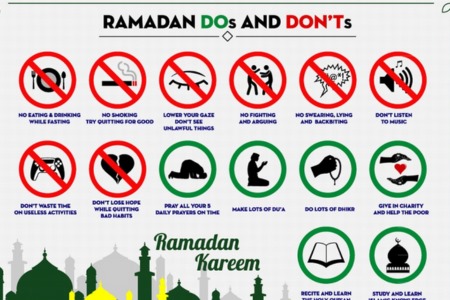The holiest month, Ramadan, in the Islamic calendar, is a precious time of fasting, prayer, reflection, and self-discipline for all Muslims worldwide. Muslims are urged to adopt specific customs and refrain from certain activities throughout this holy month. Here, we’ll see all the do’s and don’ts for the month of Ramadan to help you make this month the most precious. Let’s jump into it.

The Do’s of Ramadan:

Here are all the steps that you can implement in this precious month:
- Fasting (Sawm): The most significant obligation of Ramadan is fasting from dawn until sunset. Muslims abstain from food, drink, smoking, and marital relations during fasting hours as an act of worship and self-discipline.
- Prayer (Salah): Muslims are encouraged to perform the five daily prayers regularly, with added emphasis on Taraweeh prayers performed at night during Ramadan. Prayer helps maintain a spiritual connection with Allah and strengthens faith.
- Recitation of the Quran: Ramadan is a time for increased Quranic recitation and reflection. Muslims strive to read, understand, and contemplate the teachings of the Quran throughout the month, aiming to complete the entire book by the end of Ramadan.
- Charity (Zakat and Sadaqah): Giving charity is highly encouraged during Ramadan, as it purifies wealth and earns spiritual rewards. Muslims often give Zakat (obligatory almsgiving) and Sadaqah (voluntary charity) to support the less fortunate in their communities.
- Seeking Forgiveness: Ramadan is a time for seeking forgiveness for past sins and making sincere repentance. Muslims engage in acts of repentance, seek forgiveness from Allah, and reconcile with others to purify their hearts and souls.
The Don’ts of Ramadan:

Here are all the don’ts of Ramadan which you can avoid in this precious month:
- Eating, Drinking, and Smoking: Muslims must abstain from food, drink, and smoking during fasting hours. Consuming anything invalidates the fast and diminishes its spiritual benefits.
- Sinful Behavior: Ramadan is a time for spiritual purification and self-restraint. Muslims should avoid engaging in immoral behavior such as lying, backbiting, gossiping, and engaging in arguments or conflicts.
- Wasting Time: Ramadan is a precious opportunity for spiritual growth and reflection. Muslims should avoid wasting time on frivolous activities and instead dedicate their time to acts of worship, Quranic recitation, and charitable deeds.
- Neglecting Prayer: Muslims should not neglect their daily prayers or delay them unnecessarily during Ramadan. Prayer is a fundamental aspect of Islamic worship and should be performed with sincerity and devotion.
- Excessive Indulgence: While it is permissible to enjoy permissible pleasures during non-fasting hours, Muslims should avoid excessive indulgence in food, entertainment, and worldly distractions. Ramadan is a time for moderation and self-discipline.
Wrapping up:
Observing the do’s and don’ts for the month of Ramadan is essential for maximizing the spiritual benefits of this blessed month. By fasting with sincerity, engaging in acts of worship, practicing self-discipline, and avoiding sinful behavior, Muslims can strengthen their faith, purify their souls, and draw closer to Allah. May Allah bless all believers with a fruitful and spiritually rewarding Ramadan. Learn more on Stories Lap.





















